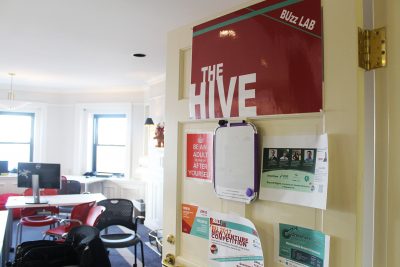
Boston’s tech scene, already struggling to find skilled workers, could be even more impacted under newly proposed restrictions to the H-1B visa program.
The U.S. Citizenship and Immigration Services announced an initiative to create “measures to further deter and detect H-1B visa fraud and abuse” in a press release on April 3.
Intended to aid American companies in hiring highly-skilled foreigners to fill shortages within the U.S. workforce, the H-1B visa program is particularly influential to the tech industry, which often employs foreign talent. Already in high demand and low supply, H-1B visas are annually awarded to a select 85,000 petitioners, a number that could be reduced by the measures the USCIS is attempting to enact.
Confronted with the possibility of even fewer visas being awarded, Boston’s tech industry has expressed concern about its future.
“There’s a great talent crisis that we have right now,” said Tom Hopcroft, president and CEO of Mass Technology Leadership Council. “We can’t fill the positions we have.”
Ian Mashiter, a professor in Boston University’s Questrom School of Business and director of its BUzz Lab, which fosters student entrepreneurs, echoed Hopcroft’s sentiments.
“If you take Boston in particular, we’re short of talent here,” Mashiter said. “And so if you look at how Boston ranks as a startup ecosystem … we’re ranked very highly … but one of the things that is a weakness is the fact that it’s hard to hire talent.”
In order to supplement their local supply of talent, tech companies often hire highly-skilled immigrants, Hopcroft said. However, if enacted, the USCIS’s changes to the H-1B visa program could further exacerbate tech’s need for talent by reducing the number of visas granted, making it more difficult to hire qualified foreigners.
“I know a lot of [international students] have expressed concern, even before the current administration, about their ability to receive a visa and stay in the country to work,” said Dennis Lally, a second-year graduate student at the Massachusetts Institute of Technology as well as the co-founder and CEO of tech startup Rendever. “And now it’s going to be even more challenging.”
Immigrants, Hopcroft said, are also essential to America’s continued presence as a world leader in innovation.
“We pride ourselves on being the center of the world when it comes to innovation and technology and it’s pretty clear that these policies could put that in jeopardy,” Hopcroft said. “Imagine a world where all of the new Facebooks and Googles and Amazons … are being started abroad. It’s going to be a little bit of a shock to the identity, pride and prosperity of America.”
Hopcroft did, however, concede that the current H-1B visa program is in need of reform.
“Rather than restricting those visa applicants, we should really be increasing or lifting the cap on the H-1B visas to really drive and increase innovation and economic prosperity in this country,” Hopcroft said.
Nadav Hazan, a senior in Questrom, can personally attest to the power of a visa.
Hazan, born in Israel, immigrated to the United States when his father was granted a visa to work for a startup. A couple years later, the Hazan family became U.S. citizens. Now, Hazan said he aspires to create his own startup.
Other students born abroad like Hazan, who have similar ambitions but lack citizenship, are unlikely able to carry out their entrepreneurial endeavors in the United States.
“As a BU professor and someone who works with student startups, it’s a shame to see that some of the startups that students want to establish that are headed up by international students can’t be started here because of visa restrictions,” Mashiter said. “And I don’t understand how that can be beneficial to the country’s economy.”
Forecasting what a future with fewer immigrants would look like, Hopcroft stressed the possibility of losing powerful innovators and the necessity of contemplating America’s best interests.
“We know that [immigrants] are the ones that, you know, if they’re not creating companies here, they’re going to go somewhere else and do it,” Hopcroft said, “So, the next Google could be started somewhere else, and we have to decide as a nation if that’s something we ought to do.”



























































































































Joan • Apr 11, 2017 at 9:33 am
There is nothing wrong with the next google or Amazon being started abroad. This is a fake problem with a solution that decimates the job prospects of U.S. citizens.